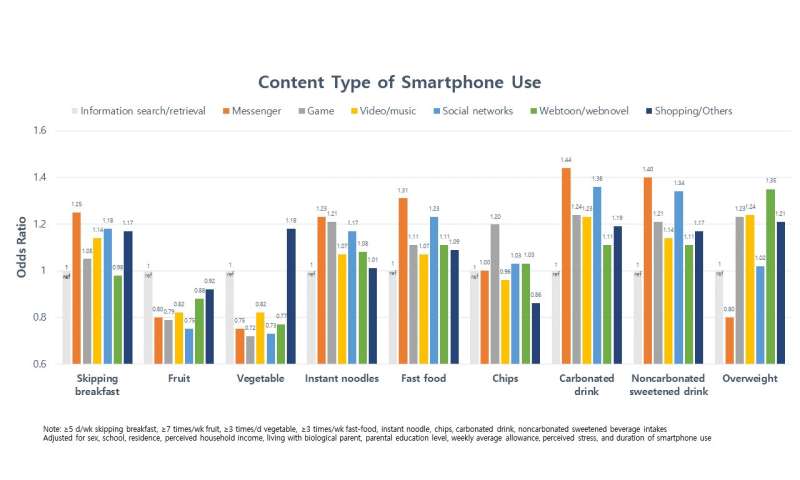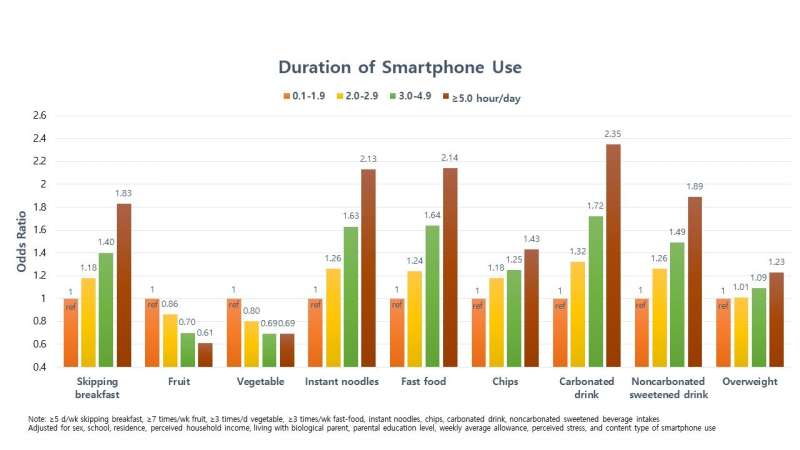Smartphone use associated with unhealthy eating and overweight in teens
Even moderate smartphone use may influence teens' diet and weight, according to a new study of more than 53,000 Korean adolescents. Teens who used a smartphone for more than 2 hours per day were significantly more likely to eat more junk food and fewer fruits and vegetables than those spending less time on their phone. Teens spending more than 3 hours per day on a smartphone were significantly more likely to be overweight or obese.
"While earlier studies have shown that TV watching is an important factor that increases the risk of obesity in children and adolescents, little is known about the effects of modern screen time such as smartphone use on diet and obesity," said Hannah Oh, ScD, assistant professor at Korea University and the study's senior author. "Our data suggest that both smartphone usage time and content type may independently influence diet and obesity in adolescents."
Childhood obesity is becoming more prevalent in many countries, including Korea and the U.S. Children with obesity are more likely to be obese as adults and face a higher risk of heart disease, diabetes and other health problems.
Seaun Ryu, a master's student at Korea University and the study's first author, will present the research at NUTRITION 2021 LIVE ONLINE.
The researchers analyzed data from the Korea Youth Risk Behavior Web-Based Survey, a nationally representative sample of over 53,000 Korean adolescents 12-18 years old. After accounting for variables such as socioeconomic status that may influence both obesity and smartphone ownership, the researchers examined the prevalence at which participants engaged in healthy behaviors (eating fruits and vegetables) and unhealthy behaviors (skipping breakfast and consuming fast food, chips, instant noodles or carbonated or sweetened beverages) relative to the amount of daily smartphone use and the types of content used.

The relative odds of reporting various behaviors (skipping breakfast, consuming food types) or being overweight according to the reported type of smartphone use. Credit: Hannah Oh and Seaun Ryu, Korea University
The prevalence of unhealthy behaviors and overweight rose with increasing daily smartphone use. Teens spending 5 or more hours per day on their phone were more likely to report consuming carbonated and noncarbonated sugar-sweetened beverages, fast food, chips, and instant noodles compared to those spending less than 2 hours per day on their phone.
Teens who reported using their phones more for information search and retrieval overall had healthier eating behaviors than those using their phones more for chatting/messenger, gaming, video/music and social networks. Respondents who used their smartphone most frequently for gaming, video/music or webtoon/web-novel were more likely to be overweight or obese.
Oh said potential drivers behind these trends could include exposure to food marketing in digital spaces, an increased propensity toward "mindless" eating while using a smartphone, inadequate sleep, or the displacement of time that would otherwise be spent on physical activity. She stressed the need to monitor food marketing targeting adolescents in digital media and, if warranted, work to prevent teens from being exposed to aggressive marketing or misleading messages about unhealthy foods. On the flip side, she noted that smartphones could be leveraged to improve public health through nutrition-tracking apps or by using digital platforms to make information about healthy eating more accessible.
"Adolescents of today are digital natives, who have grown up in close contact with digital devices such as smartphones, and thus are likely to be heavily influenced by them," said Oh and Ryu. "Efforts should be taken to maximize the positive effects and minimize the negative effects of smartphone use on adolescent health."
The researchers cautioned that the study was not designed to determine the temporal relationship between obesity and smartphone use; a longitudinal, prospective study would be needed to assess changes in body weight and smartphone use over time.
- Karlston
-

 1
1




Recommended Comments
There are no comments to display.
Join the conversation
You can post now and register later. If you have an account, sign in now to post with your account.
Note: Your post will require moderator approval before it will be visible.